- Home
- Keith R. A. DeCandido
DIPLOMATIC IMPLAUSIBILITY Page 7
DIPLOMATIC IMPLAUSIBILITY Read online
Page 7
“Oh, I could have, if I’d wanted to measure my life in microseconds. Both K’Tal and Talak had minions on the Pagh who would make sure that no harm would come to Kargan. Even a successful challenge would have been a failure. I intend to die in battle, not in a dark corner at the hands of a paid assassin.”
“So why didn’t he challenge you?”
Grinning, Klag said, “And lose what respect he’d scraped up for himself? His House kept him alive quite well, but even the finest assassin will not bring trust. He needed me to lead the crew so he would be spared having to.”
“So seeing him dead wasn’t exactly what you’d call a hardship,” Riker said with a sardonic smile.
“No.”
Taking another sip of bloodwine, Riker shook his head. Not for the first time, he realized he’d make a lousy Klingon. There was just no way he could take such pleasure in anyone’s death, never mind advancing in rank that way.
Klag finished off his latest mug of bloodwine and poured some more. Riker had, at this point, lost count of how much the captain had drunk. “So, as the only survivor, it was left to me and me alone to finish what we had started. After all, if I survived, some of the enemy might have as well—and that meant the battle was not yet over. I found a working scanner and saw that seven Jem’Hadar and one Vorta still lived amidst the wreckage of their ship. Armed with a mek’leth, I went to greet them.”
Smiling, Riker said, “‘Greet’ them, huh? And how’d they return the greeting?”
“Poorly,” Klag said with a vicious grin. “Oh, it was magnificent. Their Vorta had been injured, and their instrumentation destroyed in the crash. I had lost a great deal of blood, and should have felt the effects, but the death of my comrades put a fire in my belly. The Jem’Hadar may have been bred for combat, but the heart of a warrior cannot be grown in a Vorta laboratory. Within minutes, I stood amongst the corpses of my enemies, my mek’leth stained with their blood and the Jem’Hadar’s drug.” He gulped down more bloodwine, half of it running down into his goatée. Slamming the mug to the table, he smiled. “Then I passed out.”
Riker laughed. “Good timing.”
“Indeed. I came to on a ship, being examined by some doctor or other who had stanched the bleeding from my shoulder. I was told that our battle had paved the way for Defense Force and Starfleet vessels to penetrate the Allicar sector. I had left the Homeworld the lapdog of a fool. I returned as a hero of the empire.” He indicated the ship around him with his hand. “I was given this as my reward.”
“Quite a reward.”
“Yes. One wonders why you have not been similarly blessed, old friend.”
Riker sighed. He had expected this subject to come up. After all, he had remained a first officer longer than Klag had. “Big difference between us, Klag. Kargan forced you to stay under his command. I remain with Captain Picard—and on the Enterprise—by choice.”
“Then you are a fool. Whatever Picard’s merits—and I admit, he has accomplished much—even he is not worth denying yourself the greatest glory of all.”
Smiling, Riker quoted, “‘Better to reign in hell than serve in heaven.’”
Klag frowned. “What?”
Riker had uttered the quote in English. He repeated it in Klingon, substituting Sto-Vo-Kor for heaven and Gre’thor for hell. The translation didn’t entirely hold up, as those two realms in Klingon mythology were not precise analogues to the human concepts. “It’s from a human poet named John Milton. Basically, it means that it’s better to be the ruler of a bad place than to be a subordinate in paradise.”
Klag nodded. “Ah, I see. Obviously, you disagree with this poet.”
“I didn’t used to. Time was I lived my life by it. But that was before I signed onto the Enterprise—she’s the finest ship in the finest fleet under the finest captain. I couldn’t ask for a better place to serve, even if it means staying a first officer.”
Grinning, Klag said, “Plus, of course, there’s that half-Betazoid counselor of yours.”
Riker laughed, and wondered if he blushed. His cheeks certainly felt flushed, but that could have been from the bloodwine. “Your sources are good, Klag. Yes, there is her also.”
Klag shook his head. “You’re a typical human, Riker. Sacrificing duty for the sake of par’Mach.”
“I’ll take that as a compliment,” Riker said, raising his mug.
Klag threw his head back and laughed. “Of course you do, my friend!” Raising his own mug, he said, “I toast us both. Two warriors who have at last found their place in the universe.”
Riker smiled and clanked his mug against Klag’s. “I’ll drink to that.” Suiting action to words, he drained his mug. “And with that, I really do need to be getting back. We’re due at Starbase 10 in two days.”
Klag stood up; Riker did likewise. “It was good to see you again, my old comrade. Perhaps someday, we will fight side by side—you in the ship of your dreams, and I in mine.”
Riker had had enough battles over the past couple of years to last him several lifetimes, but he gamely said, “It would be an honor, old friend.”
“Good.” Klag hesitated. “One question, before you go.”
“What?”
Again, Klag hesitated. “Ambassador Worf. You served with him.”
“For over seven years. He’s one of the finest officers I’ve ever known.”
“Then you think he is worthy of his new position?”
Folding his arms, and resisting the obvious answer to the question, Riker said, “I take it you don’t?”
“What I think is that he received this post because he is of Martok’s House, just as Kargan gained his by being of K’Tal’s. And I have had my fill of such things.”
Riker straightened. “Worf isn’t Kargan. And the Federation isn’t in the habit of basing its diplomatic assignments on nepotism.”
Klag got a faraway look for a moment, then blinked at Riker. Then he laughed and slapped Riker on the shoulder—but it was not Klag’s trademark throw-back-the-head laugh, more of a snort or a chuckle, if a Klingon could ever be said to chuckle. “Perhaps not. Well, enough of this. You must be returning to your ship. And let me give you a piece of advice.”
“Yes?”
“Grow the beard back. You look like a Romulan without it.”
Returning Klag’s laugh, Riker said, “I’ll think about it. Qapla’, Klag.”
“Qapla’, Riker. And farewell.”
As Riker headed toward the Gorkon’s transporter room, he thought, That’s two Klingons who think I should grow the beard back. Maybe I should consider it.
Then he remembered kissing Deanna while still bearded and her subsequent reaction: “Yuck.”
Naaaaahh.
When Worf concluded his meal with Martok, he was greeted in the transporter room by Drex.
“Commander,” Worf said as he stepped down from the platform. “Has my aide arrived?”
“Yes,” Drex said. “I will take you to your quarters.” Drex then walked up to Worf and stared him directly in the eyes. “We are House-mates now, son of Mogh. See that that does not change.”
Worf had to stop himself from rolling his eyes. But then, he did not expect Drex to make it easy for Worf to fulfill Martok’s request. “If it does change, Drex, it will be of no consequence.”
Drex snorted, then turned and exited the room. Worf followed.
A woman in a bekk’s uniform stood at attention outside the quarters where Drex led Worf.
“This,” Drex said as the doors opened at their approach, “is Krevor. She has been assigned to you for the duration of this mission. Unless,” Drex added with a sneer, “you have some objection.”
Sighing, Worf said, “I have none.”
Drex glared at Worf. “Very well. If there is anything you need, Ambassador—I am sure you will know how to obtain it.”
With that, Drex turned on his heel and left.
Worf shook his head as he entered his quarters. He suspected that Drex had del
iberately chosen a female as an insult. However, if Worf was insulted by anything, it was Drex’s belief that Worf would be so easily offended.
The room he entered was large by Defense Force standards, which meant it was still smaller than anything on the Enterprise. In fact, it reminded Worf of the quarters he had taken on the Defiant, though this had two separate beds instead of bunks. He and Wu were meant to share.
The latter sat on one of the beds. He rose at Worf’s entrance. “I may be going out on a limb here, sir,” he said slowly, “but I get the feeling there’s some bad blood between you and the commander.”
Worf nodded, and noted that his duffels were on the floor next to the other bed. “We met when I was first assigned to Deep Space Nine. It was shortly before the empire’s invasion of Cardassia. Drex was bullying the station’s personnel, and he assaulted one of the Promenade shopkeepers. Drex is also the son of Martok.”
“Ah, I see,” Wu said. The aide still wore the red vest, now over a black shirt and dark green trousers. “He assumed that his family status gave him carte blanche to act like an idiot.”
Worf nodded as he set the Kahless-and-Morath statue on the desk. “Something like that. I challenged Drex and took his d’k tahg in order to get Martok’s attention. Or, at least, the person I thought was Martok.”
“The changeling?” Wu asked.
Again, Worf nodded. “After I rescued the real Martok from the Jem’Hadar prison camp, he made me part of his House. Drex objected.”
“Because of the way you embarrassed him?”
“Yes. But Martok knew nothing of that, and did not care.”
Wu shook his head and chuckled. “So Drex is stuck between a rock and a hard place. You’re an honored part of the House, so he has to treat you as such—or, at least, not actively challenge you—but he hates your guts.”
“An apt summary,” Worf said.
“We’ll need to keep an eye on him, then,” said Wu, pulling his padd out of his vest pocket and making notes on it. “Someone with that kind of grudge could cause problems.”
The door chime rang.
“Enter,” Worf said.
Krevor stood in the doorway. “May I speak with you, Ambassador?”
“Of course,” Worf said, taking a seat at the desk.
The young woman entered. She had fairly straight black hair, dark eyes, and a soldier’s bearing. “I just would like you to know, sir, that I consider this assignment to be a great honor, and that I look forward to the opportunity to die for you.”
Noble sentiments, Worf thought, but said in a rotemanner. He suspected there was more to this. “But—?”
“If you feel that I am not worthy of this assignment, I would not be insulted if you requested another.”
Worf leaned back in his chair. “Really? And why wouldn’t you be?”
Krevor frowned. “Sir?”
“Are you not a loyal soldier of the empire, the same as the others who serve on this vessel?”
She straightened. “Of course, sir!”
“Then if I did request another, why would this not insult you? If I were in your place, I would not suffer such an offense lightly.”
“That is not what I meant, sir.”
“But it is what you said.”
Now Krevor started to shift her weight from foot to foot. “May I speak freely, sir?”
Worf nodded.
“I believe that Commander Drex gave this assignment to me in order to give you offense. I merely did not wish you to suffer it needlessly.”
Worf regarded her. “Why would you in particular give me offense? We have never met. Our Houses cannot be in conflict, since Commander Drex and I are both of the House of Martok. If any such conflict existed, he would have addressed it by now.”
Krevor blinked in surprise. “No, sir. I have no House. That is why I joined the Defense Force—to make my own honor, since I cannot take refuge in the honor of my House.” Unlike her offering of her life, this statement was said with feeling. “I simply meant that he gave the assignment to a female, sir.”
“You are quite presumptuous, Krevor. You assign motives to your superior officer. You presume that I am incapable of detecting those motives myself. And you think me to be ignorant.”
“Sir?”
“Did Lukara not fight alongside Kahless at Qam-Chee? Was Melota not Aktuh’s equal in battle? Did Azetbur not finish the work begun by her father, for whom this ship was named?” Worf stood up and faced the young woman. “The body is but a shell. If you have the heart of a warrior, it does not matter the form that contains that heart.”
Krevor closed her eyes. “I have committed the very offense I sought to spare you. I offer my life in restitution.”
Worf shook his head. “Your life was mine the moment you received this assignment. For me to take it now would be—wasteful. Return to your post.”
If Krevor felt relief at her life being spared, she did not show it. Instead, she simply said, “Yes, sir,” turned around, and exited the room.
As the doors closed, Wu let out a small chuckle. “Klingon sexism—gotta love it.”
Sparing Wu a mild glare, Worf called up Krevor’s record. She, indeed, had no House, having been raised in a brothel, the daughter of a deceased harlot and one of her customers. When she had reached the Age of Ascension, she joined the Defense Force. Her ignoble birth had left her no chance of being an officer, but she did not let that stop her.
Now there were layers to Drex’s insult. Besides being a female, Krevor was also a reminder that the House of Mogh into which Worf had been born no longer existed, thanks to Worf’s own actions. If not for Martok, Worf would still have no House.
But I will not do him the honor of acknowledging it, Worf thought as he turned to the computer station on the desk. Besides, Krevor’s record was excellent. She’d served well during the war, and even gained a commendation—no small feat for a House-less provincial. That she had overcome the obstacles of her birth spoke well of her.
Worf doubted Drex would appreciate that.
Klingon ships did not come equipped with windows, so Worf programmed his computer station to provide a view of the Enterprise and the Sword of Kahless as they went into warp—the former on a heading that would take it to Starbase 10 near the Romulan border, the latter toward Qo’noS. After a moment, the Gorkon did likewise, heading for taD.
Worf’s Starfleet career had been like an opera, whose overture had been his acceptance into the Academy. The songs included battles against foes ranging from the omnipotent Q to the relentless Borg to the ruthless Jem’Hadar. He had visited dozens of parallel universes, survived torture at the hands of both Romulans and Breen, and held the legendary Sword of Kahless. He had gained friends, lost comrades, and met the brother he never knew he had. He had witnessed the “rebirth” of Kahless as a clone, and helped install him as emperor. He had twice survived exile from his own people.
He had killed a chancellor in honorable combat and named his successor.
He had seen two mates die. He had raised a son.
Our triumph on Cardassia was truly the final song, Worf thought. Everything since—the farewell party onDS9, seeing my parents and Jeremy on Earth, travelingon the Enterprise—have been the curtain calls.
Now the performance has ended. It is time to begin anew saga.
He shut off the computer station.
Chapter Three
IF LESKIT HAD KNOWN that B’Elath would sing all fifteen verses of “The Campaign at Kol’Vat,” he’d have eaten dinner in his quarters.
Shortly after the shakedown cruise had commenced, it became a tradition on the Gorkon for someone to sing before the evening meal. Leskit generally didn’t object to this, as long as the song was decent and short.
“The Campaign at Kol’Vat” was neither. It told of a battle at Goqlath Castle in Kol’Vat, in which the hero Krim enabled his forces to storm the castle by slitting the throats of the castle guards during a moonless night. Some said that it was f
rom the stories of Kol’Vat that the saying, “Four thousand throats may be cut in one night by a running man” derived, though many linguists felt that the quote predated both the song and the campaign.
Leskit had never liked the song or the saying—he’d seen the ruins at Kol’Vat, and at most they would have had two hundred guards, not four thousand, and then only if they stood crammed side by side. The tune was rote, the rhymes were pedestrian, the meter was stultifying—and B’Elath, one of the engineers, was also a terrible singer.
Worse, dinner would not be served until she finished the fifteenth verse.
Leskit looked around, surprised to see that neither Klag nor Drex had joined them. The captain and first officer were by no means required to dine with the troops, but over the past month one of them always did, if not both. The ambassador hadn’t joined them, either, but Worf hadn’t attended troop dinners when he served as first officer on the Rotarran during the war, so Leskit hadn’t expected that.
The pilot stroked his white beard, which he had trimmed to resemble a pair of horns pointing downward. He had to admit to some amusement at Worf’s appointment. He was very curious to see how this mission would turn out.
Kurak wasn’t present, either, but Leskit had come to expect that. The chief engineer always ate in her cabin. A pity, he thought. There’s fire in that one. So far, though, Leskit hadn’t been able to warm his hands in that fire. But he had hope.
Just as Leskit was about to give up and follow Kurak’s example, B’Elath sang the longed-for final verse, the warriors in the mess hall cheered—No doubt, Leskit thought, grateful that this particular nightmare is over—and several people brought the dinner out.
Right away, Leskit’s mood improved. He had always considered himself something of an epicure, and years of service had led him to expect horrendous food from Defense Force replicators. But the food on the Gorkon had become quite good over the last month.

 Alien
Alien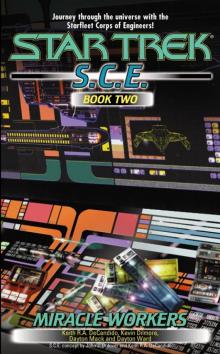 Miracle Workers
Miracle Workers Articles of the Federation
Articles of the Federation Supernatural Heart of the Dragon
Supernatural Heart of the Dragon War Stories: Book Two
War Stories: Book Two The Zoo Job
The Zoo Job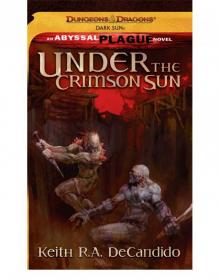 Under the Crimson Sun
Under the Crimson Sun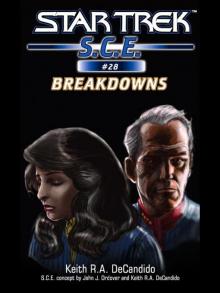 Breakdowns
Breakdowns Mermaid Precinct (ARC)
Mermaid Precinct (ARC) Supernatural 1 - Nevermore
Supernatural 1 - Nevermore STAR TREK - The Brave and the Bold Book One
STAR TREK - The Brave and the Bold Book One Four Walls
Four Walls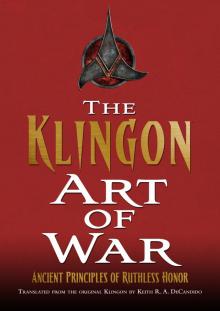 The Klingon Art of War
The Klingon Art of War Blackout
Blackout War Stories: Book One
War Stories: Book One The Brave and the Bold Book Two
The Brave and the Bold Book Two Honor Bound
Honor Bound Sleepy Hollow: Children of the Revolution
Sleepy Hollow: Children of the Revolution Worlds of Star Trek Deep Space Nine® Volume Three
Worlds of Star Trek Deep Space Nine® Volume Three Star Trek: TNG: Enterprises of Great Pitch and Moment
Star Trek: TNG: Enterprises of Great Pitch and Moment Genesis
Genesis Demons of Air and Darkness
Demons of Air and Darkness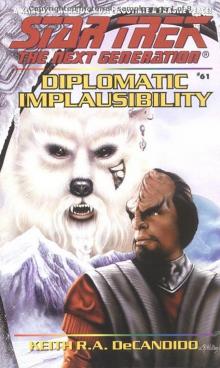 Star Trek - TNG - 61 - Diplomatic Implausibility
Star Trek - TNG - 61 - Diplomatic Implausibility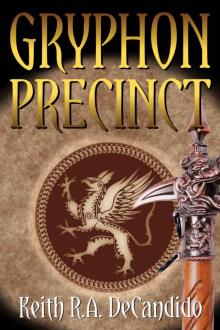 Gryphon Precinct (Dragon Precinct)
Gryphon Precinct (Dragon Precinct)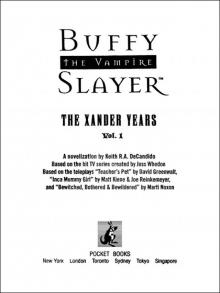 THE XANDER YEARS, Vol. 1
THE XANDER YEARS, Vol. 1 Nevermore
Nevermore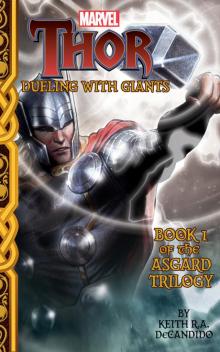 Thor
Thor The Brave And The Bold Book One
The Brave And The Bold Book One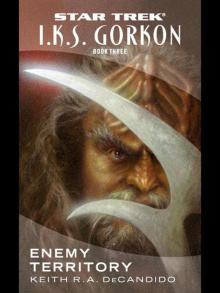 I.K.S. Gorkon Book Three
I.K.S. Gorkon Book Three STARGATE SG-1: Kali's Wrath (SG1-28)
STARGATE SG-1: Kali's Wrath (SG1-28) Bone Key
Bone Key Guilt in Innocece
Guilt in Innocece Star Trek - DS9 Relaunch 04 - Gateways - 4 of 7 - Demons Of Air And Darkness
Star Trek - DS9 Relaunch 04 - Gateways - 4 of 7 - Demons Of Air And Darkness The Art of the Impossible
The Art of the Impossible I.K.S. Gorkon Book One: A Good Day to Die
I.K.S. Gorkon Book One: A Good Day to Die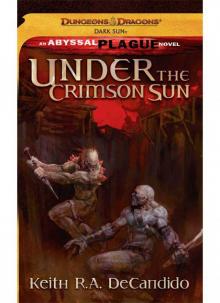 Under the Crimson Sun (the abyssal plague)
Under the Crimson Sun (the abyssal plague)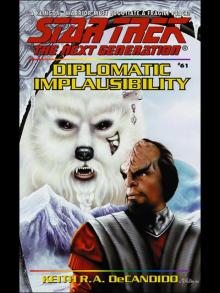 DIPLOMATIC IMPLAUSIBILITY
DIPLOMATIC IMPLAUSIBILITY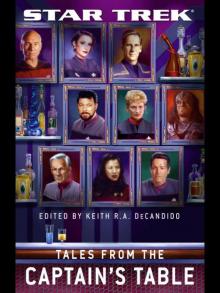 Tales from the Captain's Table
Tales from the Captain's Table A Burning House
A Burning House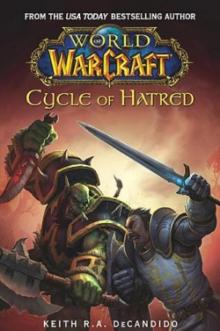 Cycle of Hatred (world of warcraft)
Cycle of Hatred (world of warcraft) Have Tech, Will Travel
Have Tech, Will Travel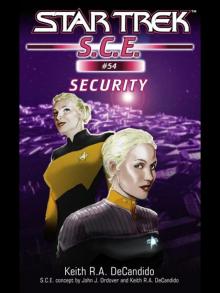 Security
Security